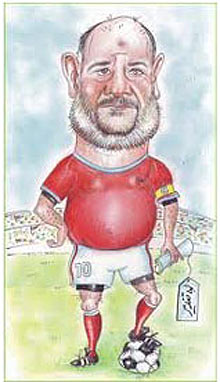What about Mitt Romney and his fun-loving ways at prep school? What about that time he rallied a bunch of fellow seniors to tackle a junior, hold him down, and cut his hair off?
John Lauber, a soft-spoken new student one year behind Romney, was perpetually teased for his nonconformity and presumed homosexuality. Now he was walking around the all-boys school with bleached-blond hair that draped over one eye, and Romney wasn’t having it.
“He can’t look like that. That’s wrong. Just look at him!” an incensed Romney told Matthew Friedemann, his close friend in the Stevens Hall dorm, according to Friedemann’s recollection. Mitt, the teenage son of Michigan Gov. George Romney, kept complaining about Lauber’s look, Friedemann recalled.
A few days later, Friedemann entered Stevens Hall off the school’s collegiate quad to find Romney marching out of his own room ahead of a prep school posse shouting about their plan to cut Lauber’s hair. Friedemann followed them to a nearby room where they came upon Lauber, tackled him and pinned him to the ground. As Lauber, his eyes filling with tears, screamed for help, Romney repeatedly clipped his hair with a pair of scissors.
It’s a plant! This Friedemann fella is a secret friend of Obama’s.
The incident was recalled similarly by five students, who gave their accounts independently of one another. Four of them — Friedemann, now a dentist; Phillip Maxwell, a lawyer; Thomas Buford, a retired prosecutor; and David Seed, a retired principal — spoke on the record. Another former student who witnessed the incident asked not to be identified.
Oh. Probably not a plant then.
I’ve seen a lot of “he was young” commentary. But he wasn’t all that young: he was a senior in high school. By that age you’re sort of expected to control impulses to tackle people and cut off their hair. You’re also sort of expected to know how to live and let live. You’re expected to grasp that whatever your likes and dislikes may be, you don’t get to enforce them on other people with physical force.
Notice, too, that Romney collected a gang of people to tackle this one kid – who was a target for being Not Manly Enough.
Romney sounds like a high school shit. Yes, some people are high school shits and then improve – but some are just shits.
“It happened very quickly, and to this day it troubles me,” said Buford, the school’s wrestling champion, who said he joined Romney in restraining Lauber. Buford subsequently apologized to Lauber, who was “terrified,” he said. “What a senseless, stupid, idiotic thing to do.”
“It was a hack job,” recalled Maxwell, a childhood friend of Romney who was in the dorm room when the incident occurred. “It was vicious.”
“He was just easy pickin’s,” said Friedemann, then the student prefect, or student authority leader of Stevens Hall, expressing remorse about his failure to stop it.
The incident transpired in a flash, and Friedemann said Romney then led his cheering schoolmates back to his bay-windowed room in Stevens Hall.
Friedemann, guilt ridden, made a point of not talking about it with his friend and waited to see what form of discipline would befall Romney at the famously strict institution. Nothing happened.
So the others are troubled by it but Romney isn’t. The others feel remorse and Romney apparently doesn’t. That too is interesting.
His campaign is portraying him as a likable, funny guy at prep school, and that apparently fits the record. But.
But Friedemann and several people closest to Romney in those formative years say there was a sharp edge to him. In an English class, Gary Hummel, who was a closeted gay student at the time, recalled that his efforts to speak out in class were punctuated with Romney shouting, “Atta girl!” In the culture of that time and place, that was not entirely out of the norm. Hummel recalled some teachers using similar language.
It’s not entirely out of the norm in the culture of this time and place, either. “Like a girl” – still a popular insult; just ask Tom Harris MP. But the norm is never universal, and it wasn’t universal even then. Some people are thoughtful enough to realize that the norm can be stupid or vicious or both.


(This is a syndicated post. Read the original at FreeThoughtBlogs.)



